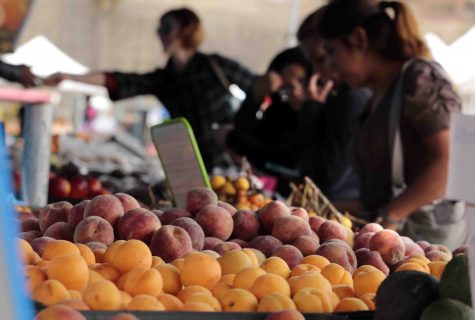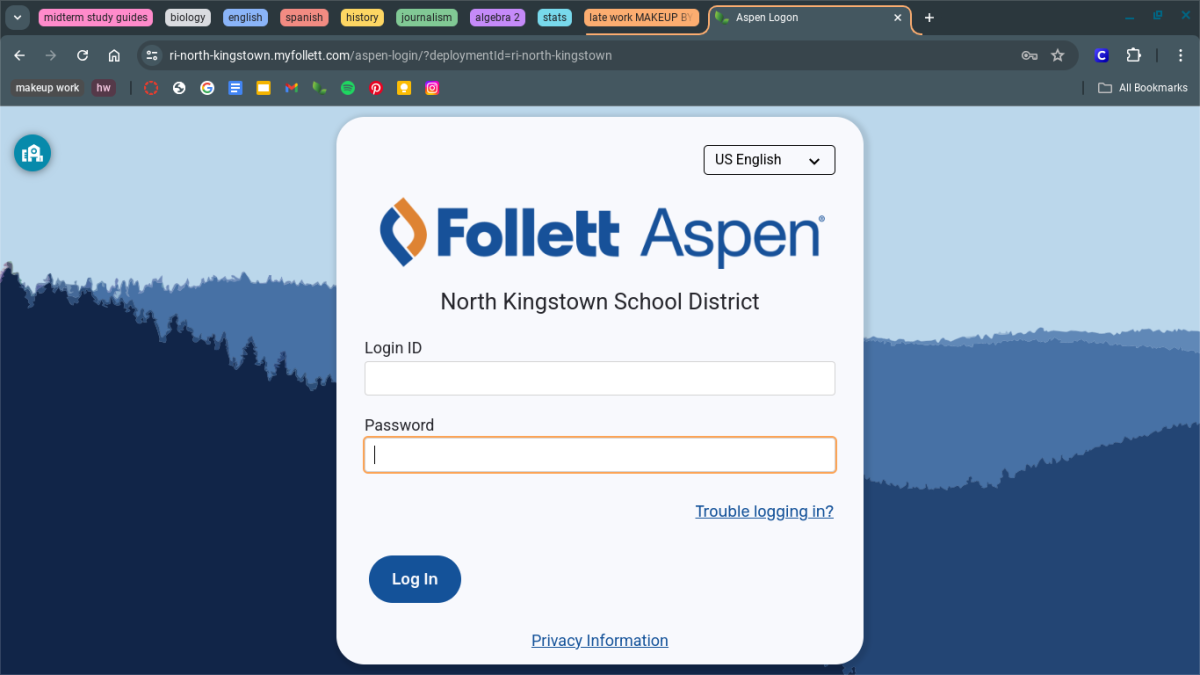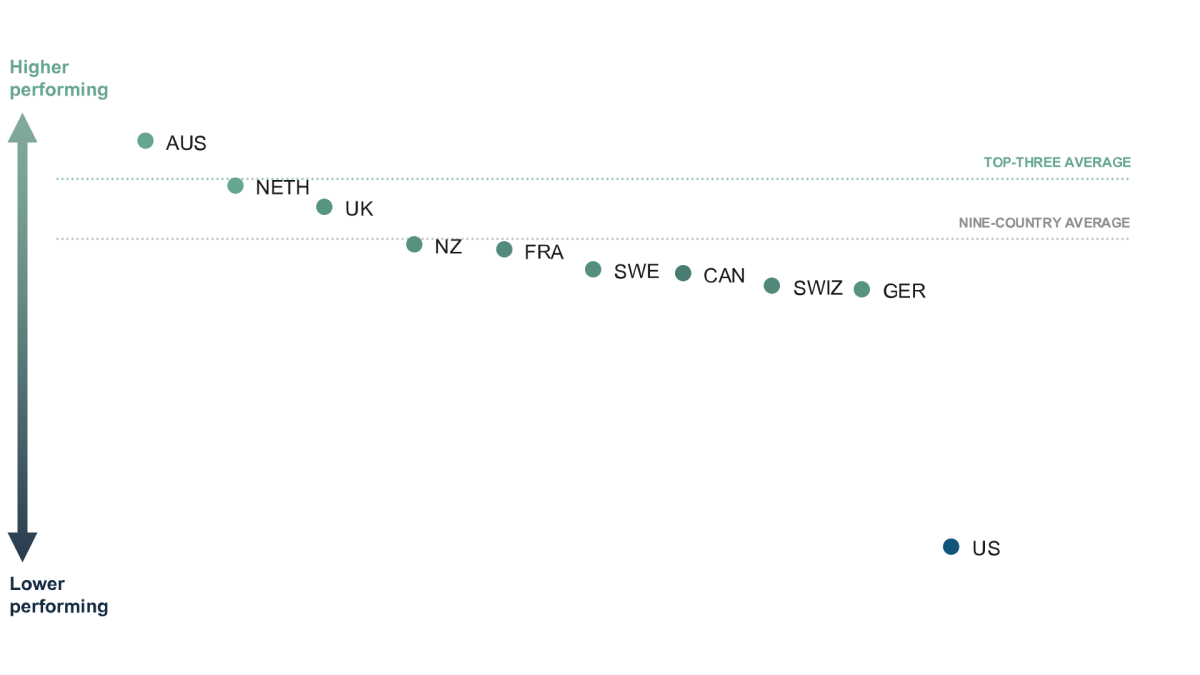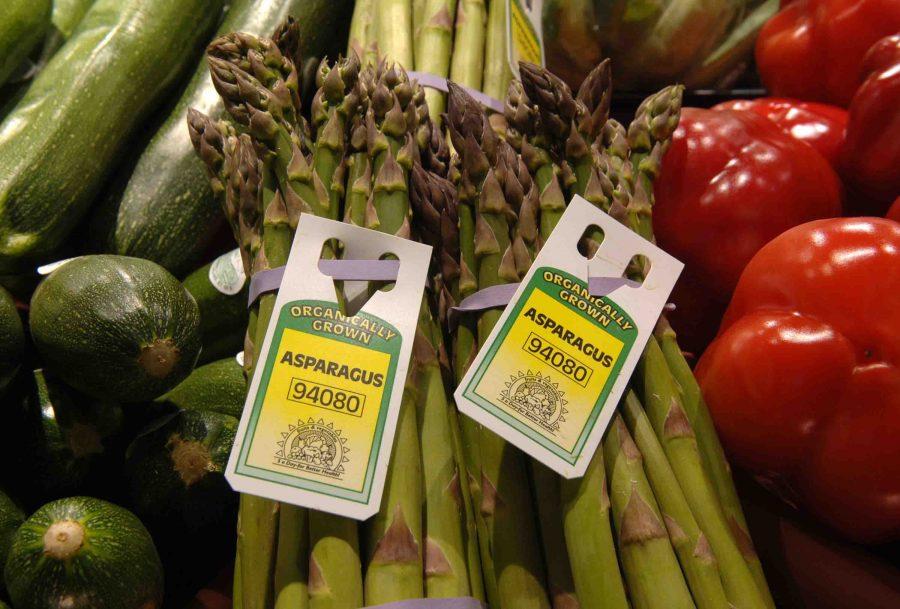The benefits to buying organic
Mark Boster/ Los Angeles Times / TNS
Organic asparagus sits between red peppers and zucchini at Dominick's in Chicago, Illinois.
Organic. Something many people have heard about, but don’t fully understand what it means. By definition, organic produce and other ingredients are grown without the use of pesticides, synthetic fertilizers, sewage sludge, genetically modified organisms, or ionizing radiation and animals that produce meat, poultry, eggs, and dairy products do not take antibiotics or growth hormones.
Organic food has begun to show a prominence in the United States, where people are looking for more healthy, unprocessed food. There are many benefits to organic food. Food grown organically have more antioxidants, fewer pesticides, and are better for the environment. Organic farming practices reduce pollution (air, water, soil), conserve water, reduce soil erosion, increase soil fertility, and use less energy.
Farming without pesticides is also better for nearby birds and small animals as well as people who live close to or work on farms. Animals raised on an organic farm aren’t given antibiotics, growth hormones, or fed animal byproducts. Studies show that the milk and meat is richer in nutrients. Omega-3 fatty acids, were up to 50 percent higher in organic meat and milk than in conventionally raised versions. (2016 European Study). This may be because organic milk and beef come from cattle that graze on a natural diet of grass, while conventional meat and milk usually comes from animals fed with grain.
“I choose to eat organically because I believe it’s better for me and the environment,” said senior Gianna Guillotte. “[The] processed food significantly affects me compared to organic food. I’m making organic coffee [for my senior project] because coffee is the second most traded good in the world and is the most modified. Eating organically and drinking organically can make a huge impact on the planet.”
Food non organically grown usually contains a lot of pesticides on the skin. Rinsing reduces it, but does not eliminate pesticides. Peeling sometimes helps, but valuable nutrients often go down the drain with the skin (Environmental Working Group).
When shopping look for the “USDA Organic” seal, that means it is between 95 percent and 100 percent organic.
One thing to know about organic food is that the label is important. “Natural” is not the same as organic. “Natural” or “all natural” means the food can’t have any artificial colors, artificial flavors, preservatives, or any other artificial ingredients in it. Animals can also still be given antibiotics or growth enhancers and meat can be injected with salt, water, and other ingredients. Be aware that labels such as: “Naturally raised”, “Grass Fed”, or “No hormones added” or “hormone-free” do not mean the product is organic!

Shoppers at the Farmers Market in Long Beach, Calif., browse through fresh apricots, cherries and peaches on Friday, May 8, 2015.
Now, when looking at the prices of organic food compared to non organic food, customers can see a vast increase in the cost. A study done by Consumer Reports found that organic food costs 47 percent more than non organic food. On average, someone who purchases healthy food pays over $550 more than someone who purchases unhealthy food per year.
However, there is a way to go around buying pricey organic food at your local supermarket. The easiest way to buy organic food AND save money is to buy from local farms or farmers markets. By purchasing your goods from local farms, the money stays within the community and strengthens the local economy. More money goes directly to the farmer, instead of to things like marketing and distribution. In the U.S., for example, the average distance a meal travels from the farm to the dinner plate is over 1,500 miles. This process contains a lot of fossil fuels and emits carbon dioxide into the air.
In addition, produce must be picked while still unripe. Because of this, the produce must be gassed to “ripen” it after transport or the food is highly processed in factories using preservatives, irradiation, and other means to keep it stable for transport and sale. Local food is the freshest food you can purchase. Fruits and vegetables are harvested when they are ripe and thus full of flavor. So if you are thinking about going organic, try visiting the local farmers markets coming up this summer. Your body and the environment will thank you for it.
Farmers markets:
– East Greenwich Farmers’ Market: Open June 6-October 3 2-6pm @ Eldredge Elementary
– South Kingstown Farmers’ Market: Open May 7-October 29 8:30am-12pm @ URI East Farm
– Aquidneck Growers’ Saturday (Middletown): May 21-October 29 9am-1pm @ Newport Vineyards and Winery
– Wickford Village Farmers’ Market: June 2-October 6 Thurs. 1-5pm @ Town Parking Lot
– Goddard State Park Farmers’ Market: May 6-October 28 Fri. 9am-1pm @ Goddard State Park
– Jamestown Farmers’ Market: June 29-August 31 Mon. 4-7pm @ Fort Getty Pavilion
– RI Organic: April 15-October 15 Thurs. 2-7, Fri. 12am-6pm, Sat. & Sun. 9am-4pm @ 301 Hopkins Hill Rd Coventry, RI 02816
Organic farms:**
– Simmons Organic Farm, Middletown
– Casey Farm, Saunderstown
– Sanford Farm, Exeter
– Steve’s Organic Produce, Bristol*
– Beaverhead Farm, Jamestown
– Crosswinds, North Kingstown
– East West Farm, Charlestown
Stores/restaurants that buy organic:
– Whole Foods Market
– Bravo Wood Fired Pizza
– Great Harvest Bread Co.
– Dave’s Fresh Marketplace
– McQuade’s Marketplace
– Belmont
– Trader Joe’s
*certified organic
**source: The Apeiron Institute for Sustainable Living Organic
Your donation will support the student journalists of North Kingstown High School. Your contribution will allow us to distribute a print edition of the Current Wave to all students, as well as enter journalism competitions.











